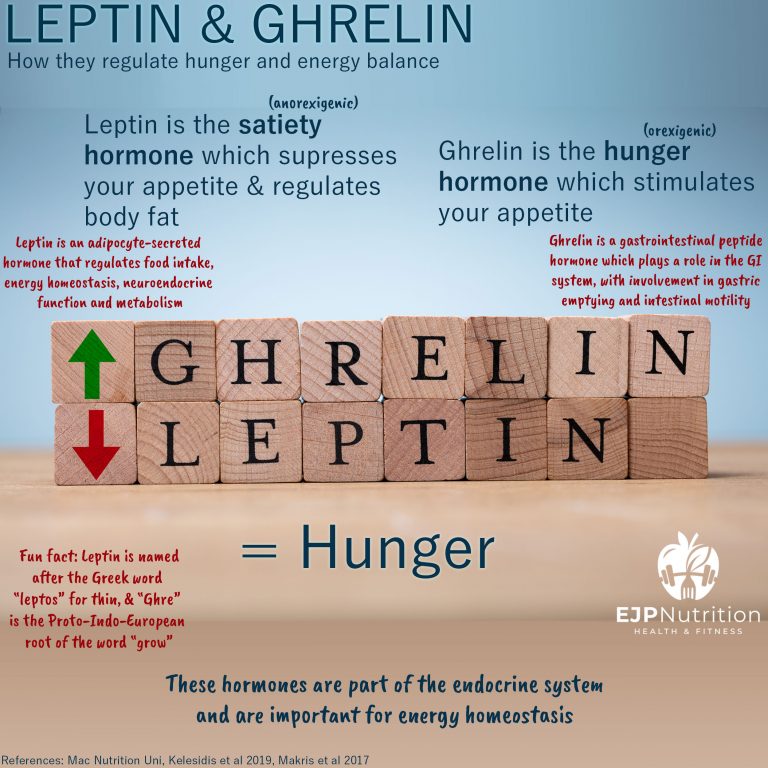In almost every blog post lately, what I’m writing about seems to effect either leptin or ghrelin. So this article is here for your reference. The reason they come up so often is they are the two key hormones regulating hunger. Ghrelin signals to our brain to increase appetite, while leptin is a major appetite suppressor and regulates energy balance by inhibiting hunger.
This is why they are mentioned so frequently. Because when you change your diet, or body weight, or routine, or don’t get enough sleep, or so many other things – it effects our leptin or ghrelin levels. This can drive us to eat more or less than we physiologically need.
That’s mainly what you need to know when a post mention leptin/ghrelin increasing/decreasing. But if you want to geek out a bit more here goes!
What is leptin? It’s an anorexigenic hormone created and stored in adipose tissue. The amount of leptin correlates with the amount of body fat. So when you lose weight, leptin decreases. As well as regulating energy homeostasis it also plays an important role in neuroendocrine function and metabolism via the CNS. It has an effect on immune function and bone metabolism too. Leptin levels are also regulated by other factors including insulin.
When you reduce your calorie intake it causes leptin levels to drop, sometimes dramatically (during fasting, or long term low EI). This is one of our body’s defence mechanisms against starvation. It wants to increase food intake while decreasing energy expenditure. One way it does this is by triggering the neuroendocrine system to decrease thyroid hormone and slow down metabolism. It can also increase energy expenditure through sympathetic nerve activity to regulate energy balance in the other direction when food intake is higher.
Studies have reported how leptin plays a role in whether a woman is able to get pregnant. Having a lower level of body fat causes it to signal to the brain to decrease reproductive hormone levels. This is because the energy stores in adipose tissue are not high enough to successfully bring a pregnancy to term. This is one of the reasons women can ‘lose’ their menstrual cycle (amenorrhoea), by not having a high enough level of body fat.
While leptin helps regulate body weight, obesity and type 2 diabetes are associated with elevated levels (both in adipose tissue, and circulating), and leptin resistance. This means individuals have a higher appetite, as the signal of satiety is being disrupted. Some clinical interventions involve leptin replacement therapy, which can help decrease insulin resistance and dyslipidemia. Although there is very mixed data on its success inducing weight loss.
It may be more of a potential intervention to help weight loss maintenance, and restore leptin levels after dieting. The associated neuroendocrine and metabolic abnormalities caused by weight loss drive us to regain weight, which can lead to yoyo dieting. So if this could help that then it has huge potential to help people with obesity. However please note this is an emerging area, and there is nothing conclusive yet.
What is ghrelin? It’s an orexigenic hormone that stimulates food intake by increasing appetite. It has a large influence on people at different weights. Compared to those with a normal BMI, people with obesity had a lower postprandial suppression of ghrelin. Meaning they still feel hunger, even after a meal. For those dieting the level of ghrelin increases, which plays into the difficulty of achieving long term weight loss. On the other end of the spectrum one study suggested patients with anorexia nervosa might have an insensitivity to ghrelin, and their appetite was under-stimulated.
There is a huge number of studies showing how ghrelin effects appetite fluctuations, and how leptin influences metabolism and energy balance. Their roles in both obesity and when dieting are not to be underestimated.
I know you may get bored of this as a recommendation. But practicing ‘healthy’ behaviours is the best way to keep your body in balance. This is important for metabolic health, and can help you remain leptin sensitive.
References: Mac Nutrition Uni, Kelesidis et al 2019, Makris et al 2017, Park & Ahima 2014
